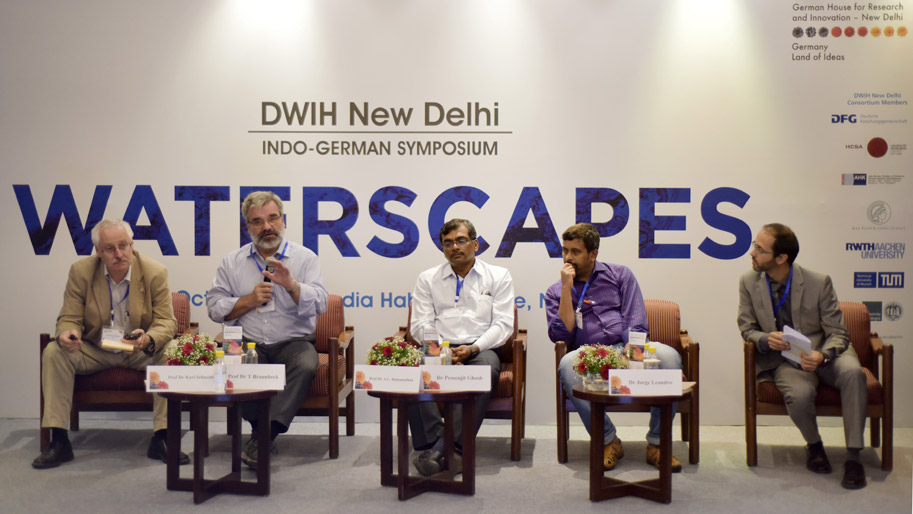DWIH WaterScapes Symposium 2017
 © DWIH New Delhi
© DWIH New Delhi
Under the auspices of the Embassy of the Federal Republic of Germany, the German House for Research and Innovation (DWIH) organised WaterScapes Symposium 2017 at the India Habitat Centre, New Delhi on 5th and 6th of October. An annual flagship Indo-German event of the DWIH New Delhi, the symposium began with a welcome address by marketing director of the German Academic Exchange Service (DAAD) – Mr Apoorv Mahendru, followed by an overtly interesting inaugural address by Dr Jasper Wieck, Deputy Chief of Mission, German Embassy, New Delhi.
While addressing the audience, Dr Wieck referred to water and water management issues as topics of global importance and cited that water as a resource is not only vital to human health but also ensures productivity and many other intangible benefits such as the convenience, well-being, dignity and privacy of its beneficiaries. Focussing on the pressing need of addressing water management issues, Dr Wieck highlighted the importance of the recent Indo-German consultations where the German Chancellor, Dr Angela Merkel and PM of India – Mr Narendra Modi mutually agreed to cooperate in the area of sustainable development including the water sector.
Further to this, Vice President of Freie Universität – Prof Dr Brigitta Schütt, in her keynote, emphasized on water related issues being age old; thus stating geography as the key player in environmental governance. According to her, traditional and local knowledge which is embedded in a community – is unique to a particular cultural and/or location and is essential to be considered when dealing with water related problems. Following this, the first session titled water security and governance as the name suggests focussed on the fact that the water is a scarce resource and hence not only should its use be regulated but the regulations should also be questioned so as to discourage the security of a water for a few elite at the cost of ensuring access to water for all. In this regard, Dr Hartwig of Max Planck Institute, Ms Lydia Powell from the Observer Research Foundation and Dr Lele from ATREE provided many insights starting from trans-boundary water sharing issues to the matter of water being a public good.
Attended by a well-informed audience comprising of academicians, students, policy-making organisations and industry representatives, the first session of the WaterScapes symposium made its way for more technical and scientific sessions on the first day. These sessions were titled as Urbanisation and Sustainable Water Resources Management and Urbanisation and Sustainable Water Resources Management: Industry Perspective which was led by Fraunhofer Gesellschaft and witnessed participation from the Fraunhofer-Institute for Interfacial Engineering and Biotechnology, TERI, Sovereign Tech and Ion Exchange India Ltd.
Marking the beginning of the second day of the event, the session titled Hydro Hazards: Floods attracted the interest of the crowd; particularly with speakers like Prof Dr Jochen Schanze (Liebniz Institute of Ecological Urban and Regional Development), Dr Leandro (Technical University of Munich) and Prof Dr Martin Voss (FloodEvac) sharing their experience and knowledge. Moreover, this session was soon followed by another interesting topic Hydro Hazard: Water Contamination where speakers talked about extreme cases of Arsenic, Lead and other kinds of water pollutants and also innovative ways of dealing with such cases of contamination. In this context, an interesting and valuable presentation came from Heidelberg University’s Prof Dr Thomas Braunbeck- who demonstrated his research of water contamination testing using fish embryo.
Further adding value to the two-day event, Integrated River Basin Management formed the last topic of the symposium. Represented by Dr Guido Schmidt of the India-EU Water Partnership, Prof Murty of IIT Madras, Prof Subashisa Dutta from IIT Guwahati and Prof Nicola Fohrer of the University of Kiel, this session marked the closing for the other technical sessions. However, in lines with the DWIH’s goal of promoting young scientists and entrepreneurs, the final session was designed to give a platform to the young minds to present their research on the topic of water. Garnering support and immense acknowledgment from one and all present, this session saw participation from Ms Theresa Frommen, a young German working for a NGO in Jaipur, Ms Marcella Hansch – founder of Pacific Garbage Screening, Mr Neha Khandekar (TERI), Ms Vinnarasi (IIT Delhi), Ms Tarini Mehta and the Falling Walls India Lab 2017 winner Ms Ekashmi Rathore.
Water being one of the most important elements for human existence needs to be used judiciously, however it’s a matter of global concern and hence people with different backgrounds need to come together so as to address this issue- and DWIH WaterScapes Symposium 2017 did just the same. It not only provided a platform for Indians and Germans to come together; but rather also brought together professionals from sciences and social sciences, academicians, industry representatives and policy makers and experts and discerning public.
Date: Thursday, October 05, 2017 to Friday, October 06, 2017
Venue: India Habitat Centre, New Delhi
